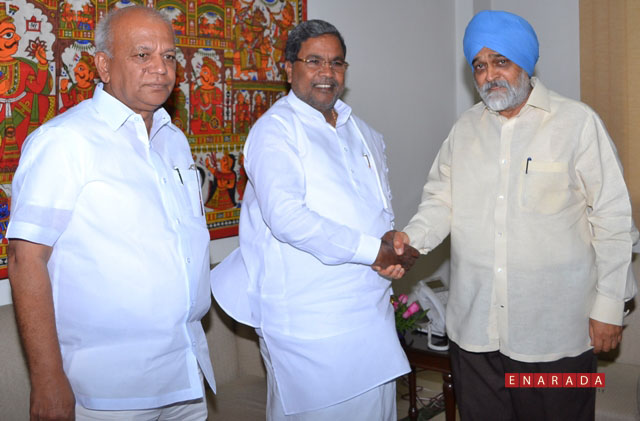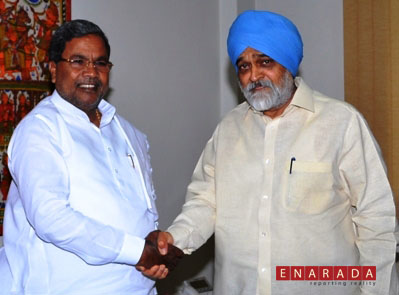
Enarada, New Delhi,June 26, 2013:
Annual Plan outlay of the state has been increased by 11.6 per cent with the Planning commission approving the plan outlay of the state to Rs.47,000 crore for the year 2013-14.
The Annual Plan for 2013-14 for the State was finalised today at a meeting between Montek Singh Ahluwalia, Deputy Chairman, Planning Commission and Siddaramaiah, Chief Minister of Karnataka.
The Plan size has been agreed at Rs. 47,000 crore which includes the central assistance to the State Plan of about Rs. 3,549 crore. In addition, an amount of about Rs. 7,000 crore is likely to flow from the Centre to Karnataka through various Centrally Sponsored Schemes. Thus, Plan funding from the Central Government to the State of Karnataka, from all sources, is expected to be over Rs.10,000 crore during 2013-14.
Ahluwalia appreciated the State Government for strategy to make growth more inclusive and giving right priority to social sector. He said the State has a good record in expenditure realisation as well as in fiscal prudence. It can play a more important role in giving lead to other States in introducing technology for improving governance he lauded.
He advised the Chief Minister to have more focussed attention in agriculture and infrastructure sectors. Public private partnership should be encouraged to expedite development process he added.
Deputy Chairman pointed out that the economic growth and state income have slowed down recently and was less than the national average. Special attention is also needed to give necessary impetus to education, health sectors and regional imbalance in social indicators.
On human development, it was pointed out that the overall health indicators of Karnataka are better than all India average but there are still few health related problems that need immediate attention. Although Child Sex Ratio (0-6 years) has shown improvement the trends need to be monitored closely so as to take necessary steps as and when needed. Though the literacy rate of Karnataka at 75.60% is above the national average of 74.04%, there is a wide gender gap of 14.72%.
Under National Rural Drinking Water Programme (NRDWP), coverage of habitations fully covered with drinking water facility is about 41% against the national achievement of 76%. The State Government is exhorted to accelerate the speed of coverage under NRDWP. As the State has more than 5,000 quality affected habitation, the State Government is urged to expedite the progress of tackling the water quality problem in the State. Planning Commission offered full support to the State in working out a water policy that would meet both short term and long term demands.
Briefing the Commission about the development strategy of the State Government, Chief Minister Siddaramaiah said several initiatives aimed at impacting the lives of the poor and marginalised people are being taken. These include enhancing the milk subsidy from Rs 2 to Rs 4 per litre. This will benefit 7.5 lakh milk producing farmers in the state. The majority of these farmers are small and marginal. The unit cost of rural housing has been raised from Rs one lakh to Rs 1.50 lakh. Subsidy for rural housing has been raised from Rs 75,000 to Rs 1.2 lakh. This includes subsidy for the Centrally Sponsored Indira Awas Yojana, as well as the State sector rural housing schemes.
He said the State was committed to provide adequate outlays for the sectors that contribute significantly to improving Human Development Indices, especially education, health, women and child development, social welfare, housing water supply and sanitation, and rural development. Systemic reforms in each of these sectors are being initiated to improve outcome indicators.
S R Patil, Minister for IT and BT was also present in the meeting.




